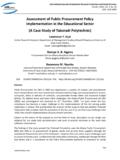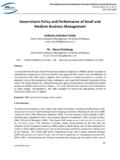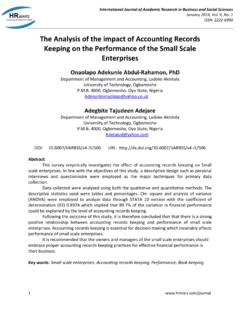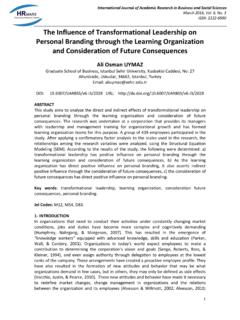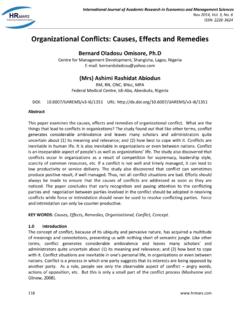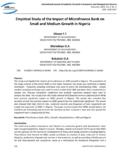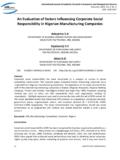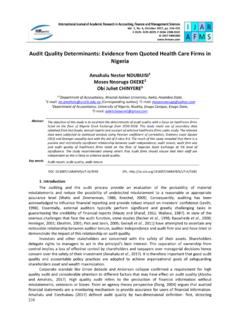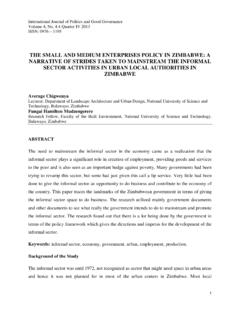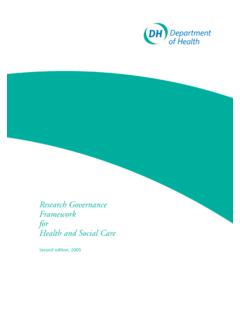Transcription of The Challenges of Leadership and Governance in Africa
1 International Journal of Academic Research in Business and Social Sciences September 2012, Vol. 2, No. 9. ISSN: 2222-6990. The Challenges of Leadership and Governance in Africa Afegbua, Salami Issa Department Of Public Administration, Faculty Of Management Sciences, Lagos State University, Ojo, Lagos State, Nigeria Adejuwon, Kehinde David Department Of Public Administration, Faculty Of Management Sciences, Lagos State University, Ojo, Lagos State, Nigeria E-Mail: Abstract This paper is a critical analysis of Leadership and Governance crises in Africa . It argues that Africa 's failures have come about largely as a result of frequent Leadership change, lack of ideology, policy reversal and weak institutional patterns. The paper also examines the Leadership selection process in Africa and that the Leadership selection process in Africa takes the imposition pattern and that African leaders have frequently come to their position with limited experience.
2 Hence, the decline in moral and discipline caused by bad policies, eroded professional standards and ethics and weakened the system of Governance . The paper lay emphasis on Leadership and Governance in some selected African countries. The paper observes that for Africa to overcome the crises of Leadership and Governance in the continent, those on whom the burden of Leadership will fall in the future must fully comprehend their responsibilities, duties and obligation. They must also be exposed and be prepared to face the Challenges of Leadership in developing society. Since the long term salvation of developing countries depends on the quality of its future leaders. The paper concludes that only Leadership that has maximum empathy for the people can be relevant to the qualitative movement of Africa . Introduction Leadership is one of the most observed and least understood phenomena on earth. A call for a focus on Leadership and Governance is timely, important and no doubt topical, reflecting the worldwide thrust toward political and economic liberalization.
3 Throughout the whole world, there has been an urgent desire among various people and government for unity, justice, peace and stability. The resurgence of this desire is not only explicable through their political policies alone; but also it is reflected in the social and economic policies (Obasola, 2002:9). In fact, most constituted governments in Africa have been undergoing serious and deepening politico- economic crisis. These problems generated by political, social and economic instability and the prevalence of ethnic, communal and religious crises, which have bedeviled Africa , call our attention to the problems of Leadership and Governance in the continent. In other words, the staggering wave of violence, insecurity, increasing crime wave, economic recession, coupled 141 International Journal of Academic Research in Business and Social Sciences September 2012, Vol. 2, No. 9. ISSN: 2222-6990. with the break in law and order are the attributes to the problem of Leadership and Governance in Africa .
4 Therefore, the quest for good Leadership is a sine-qua-non for Governance and sustainable development. A Governance approach highlights issues of state responsiveness and accountability, and the impact of these factors on political stability and economic development. For too long, social scientists dealing with Africa 's development have concentrated on economic issues, overlooking the highly important political dimension of the process (Bratton and Rothchild, 1992:263). The use by African state elites of arbitrary and repressive measures and their inability to apply governmental regulations throughout the national territory is a sign of state weakness or softness . Paradoxically, the independent African states consolidates power at the political center and extracts considerable economic resources from society; yet it spends much of it obtains on itself and lack the capacity to spur the country's development as a whole.
5 It is in light of this, that Conrnwell (1995:15) summarizes the African Leadership and Governance crises as follows: the driving force behind Africa 's experiment with democracy came both from ideology conviction and the growing impatience of an ever bolder public consciousness, and from the related manner of the continent's prevailing economic woes. On the other hand, the politically conscious urbanized, professional and studies bodies began to rail against the continue failure of their rulers to match rhetoric and promises to economic progress, for much of Africa had experienced a steady decline in living standards through the 1970's and 1980's. On their part, the World Bank, the International Monetary Fund (IMF) and other bilateral aid donors also made it quite clear that if further financial assistance was to be forthcoming. Africa 's governments had to give urgent attention to their human right's records.
6 More specifically, they had to become politically more accountable to their people, and curb corruption. It is instructive to note that no nation has achieved meaningful development socially, politically or economically without the input of or effective Leadership (Obasola, 2002:10). Thus, in contemporary discourse, the concept of Leadership and Governance has attracted a wider spread interest as they serves as the pivot on which social, political and economic structures rest. The numerous problems which have been bedeviling African states vis- -vis ethnic and communal clashes, increasing crime wave, drug trafficking, advanced fee fraud etc have been blamed on ineffective Leadership . While it is true that there have been apparent Leadership and Governance crises in Africa , the last two decades has witnessed struggle to engender effective Leadership and Governance in Africa . 142 International Journal of Academic Research in Business and Social Sciences September 2012, Vol.
7 2, No. 9. ISSN: 2222-6990. Statement Of Problem Despite over forty years of political independence, Africa 's aspiration and hopes remain today largely unfulfilled. The Leadership question has become a recurring issue in the discourse on the African project. Seteolu (2004:70) pointed out that the governing class has been target of pillory, vilification, condemnation and disdain in view of the pervasive and persistent socio- economic and political crisis. He stated further that the economic domain has been characterized by huge external debt overhang, net capital flight, disinvestments, collapse of social infrastructure, food crisis and insecurity, over-devalued national currency, pervasive poverty, unpopular, repressive and alienating economic policies. It was recognized that Africa 's failures have come about largely as a result of among other things; progressive distancing of African from the masses of the people; inadequate preparation of the Leadership that assumed the responsibility to govern their countries.
8 African leaders have frequently come to their position with limited experience. Though most of them have battled on, confronting their awesome problems of development and nation- building essentially not only unprepared but unaided, their efforts have been at best only a qualified success. There are no institutions in Africa devoted to preparing potential leaders with a global outlook, leaders who will be able to cooperate within and across national, regional and institutional boundaries. Furthermore, it is difficult if not impossible, in many African countries to gain access to relevant and timely information on most national, regional and global issues. Obasanjo (1993) noted that, it need to be realized that the morass of Governance in Africa emerged primarily as a result of lack of checks and balances in Africa 's system of Governance . In effect, for some African leaders, their nation ended up being treated as their individual personal property.
9 In other cases, a decline in moral and discipline caused or combined with bad policies, eroded professional standards and ethics and weakened the system of Governance . Poor Governance become the major challenge and source of Africa 's predicament and socio-economic crises. Only a few African leaders have voluntary left office; most others were assassinated or were disposed by military coups. In the past, many African leaders would align or threaten to align with the communist bloc or capitalist bloc in exchange for the support that allowed them to stay in power. It is against these backdrops, the critical appraisals of the African crises often identify the Leadership and Governance as the major variables to correctly historicize the nature, character and dimensions of the African problem. Leadership And Governance : Conceptual And Theoretical Commentaries The problem in an intellectual discourse of this nature is usually concerned with the definition of terms.
10 It is really very difficult to attempt a definition of Leadership , or in other words it is difficult to define what makes certain persons to be leader . For example, some researchers define Leadership in terms of personality and physical traits, while others believe Leadership is represented by a set of prescribed behaviors. Indeed, Rost (1991) found that there were 221. definitions of Leadership published in books and articles between 1900 and 1990; a number 143 International Journal of Academic Research in Business and Social Sciences September 2012, Vol. 2, No. 9. ISSN: 2222-6990. that given the recent interest in Leadership , has likely to doubled since his view. It is in light of this that Ubegbe (1999:282) defines Leadership in the following words;. Leadership is the process of creating the subordinates' identification with the group's mission and creating their desires to achieve the group's goal.
